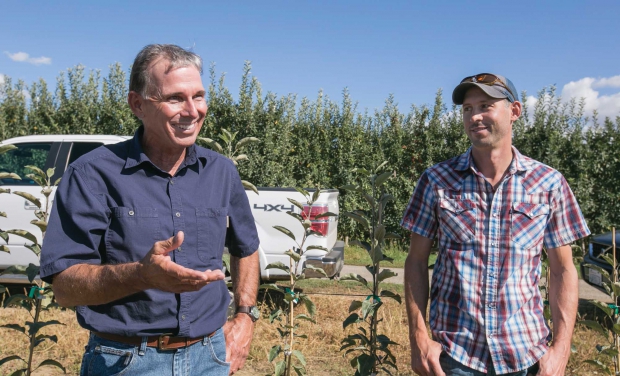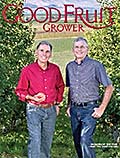
Craig O’Brien warned his son Chad, who recently joined the family farm, that owning your own business and being a farmer is akin to having a tiger by the tail. (TJ Mullinax/Good Fruit Grower)
Brothers Craig and Mike O’Brien say a passion for farming and innovation runs in their family.
More Stories |
| – Collaborative approach – Change is guaranteed – Who will pick the fruit? |
Their father, George, who earned a degree in electrical engineering from Washington State College, became a farmer in the Satus area south of Yakima, Washington. In the late 1940s, as the Roza irrigation system came on line, George moved to Prosser and grew various row crops, including potatoes, wheat, alfalfa, and sugar beets.
When the Columbia Basin irrigation project was developed in the 1950s and 1960s, bringing water to half a million acres, George realized that growers in the Columbia Basin could farm large acreages more efficiently and cheaply. That’s when he diversified into cherries and peaches.
As he expanded his orchard, George began to plant trees at higher densities in order to maximize production—a philosophy that Craig and Mike have fully embraced.
“We had to change,” said Mike, who loves to experiment, as his father did. “The most important thing to surviving on the family farm and keeping it viable was changing with the times.”
Mike, 65, earned a bachelor’s degree in fruit and vegetable production at Washington State University and returned immediately to the farm after graduating in 1971. Craig, who is four years younger, earned a degree in business administration from WSU and worked in retail before returning to the farm in 1977.
Good area
Craig said the bench where their orchard is located, at an elevation of 1,000 to 1,200 feet, proved to be a good fruit growing area. The business currently has 250 acres of apples, 45 acres of cherries, 55 acres of Concord juice grapes, and 25 acres of wine grapes.
They have farmed part of their acreage organically for about 20 years and have almost 80 acres of organic apples and cherries. Stemilt Growers named them organic cherry growers of the year in 2011.
The diverse crops and the organic acreage help spread their financial risk, and the cherries help keep their crew busy through the summer until it’s time to pick the apples.
Their apple varieties include Fuji, Gala, Braeburn, Granny Smith, and Red Delicious. Mike said that while they’ve been on the leading edge with high-density plantings, they’ve been less inclined to take the risk of planting managed varieties, many of which have yet to prove successful.
A Red Delicious block, planted in 1998, is still there because it’s a relatively trouble-free variety to farm, and there’s still a market for it.
“We have one orchard of Red Delicious,” Craig said. “I think I could farm it in my sleep. I don’t think Red Delicious is going away any time soon, and I wish I had a few more to fill in the harvest window at the end of September.”
Part of the orchard is renewed each year, though not a fixed percentage. An old block of Royal Gala is still in the ground because it is organic, and striped Galas are still well accepted in the organic market. Craig is thinking of expanding his organic acreage because of growing consumer demand.
The brothers operated C & M orchards together for almost 40 years until Mike retired last year. Early this year, Craig’s 31-year-old son, Chad, who has a degree in finance from Gonzaga University, left Seattle to work with his father and enjoy the rural lifestyle.
Craig said running an orchard is a much more complex endeavor than it was when he joined the business 37 years ago. As a small growing operation in an industry increasingly dominated by vertically integrated companies, they must keep innovating to remain competitive.
“The details are endless, and it’s critical to make as few mistakes as possible,” Craig said. “I’m thinking about my business seven days a week. You don’t get very far away from it mentally.”
Craig is pleased to see the fourth generation of their family come into the business and is excited to see Chad’s enthusiasm and pride in playing a part in production agriculture.
“It’s our opportunity to continue this legacy and, with his contribution, take it to the next level,” Craig said. “All businesses are a work in progress. Nothing is constant. Change is guaranteed. It is all to be continued …” •







Leave A Comment